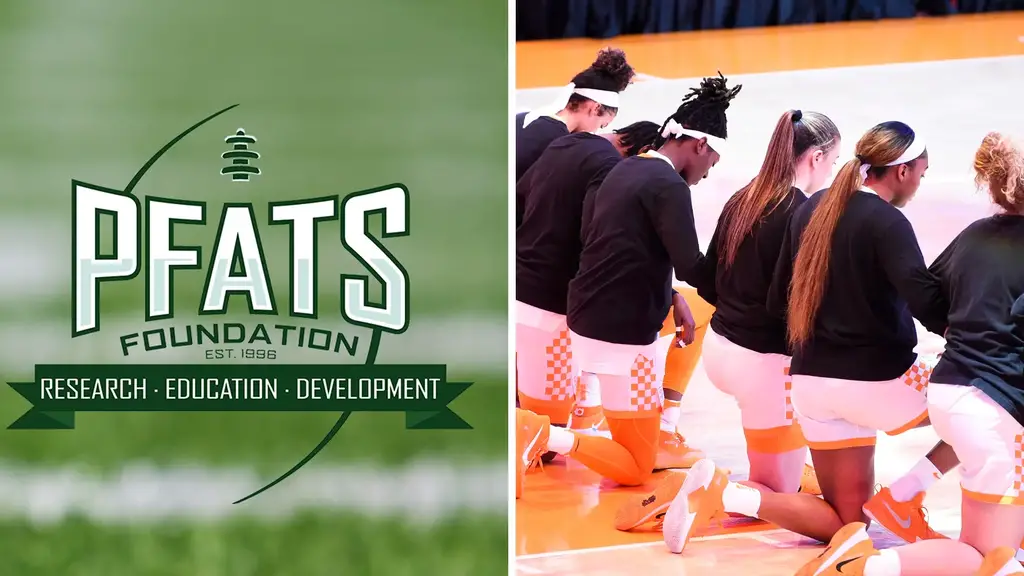In a move that has sent shockwaves through the sports world, the Professional Football Athletic Trainers Society (PFATS) has announced the cancellation of scholarships for 10 NFL students who were found guilty of the unforgivable sin of kneeling during the national anthem. This bold decision has been met with both cheers and jeers, depending on which side of the stadium you’re sitting in.

The PFATS, an organization known for its commitment to the health and well-being of professional athletes, has taken a decidedly political turn with this latest move. According to sources close to the organization, the decision to revoke these scholarships was made after “extensive review” of game footage, social media posts, and, in one case, a particularly damning TikTok video.
“We have a responsibility to uphold the values that this great nation was built on,” said a PFATS spokesperson at a hastily organized press conference. “And those values include standing for the national anthem, no matter what your personal beliefs may be. Kneeling is a sign of disrespect, and we simply cannot support individuals who choose to disrespect our flag, our country, and by extension, our athletic training programs.”
The response from the NFL community was swift, with some players and coaches expressing outrage at what they see as a gross overreach by an organization that should be focused on ankle tape and ice baths, not patriotism. Others, however, have applauded the move, arguing that it’s about time someone took a stand (or rather, insisted on standing).
One anonymous coach, who was overheard shouting into a phone during practice, reportedly said, “Good on PFATS! We need to remind these kids that football isn’t just about touchdowns and Super Bowl rings. It’s about standing tall, literally and figuratively. If you can’t even do that, you don’t deserve to be on the field, let alone receive a scholarship.”
Unsurprisingly, the players affected by this decision were less than thrilled. One of the now-former scholarship recipients, who asked to remain anonymous, expressed his frustration in a series of tweets that have since gone viral. “So I kneel for two minutes and lose my scholarship? What about the 60 minutes I spend getting hit by linebackers twice my size? Does that not count for anything?” he tweeted, along with a GIF of a facepalm that has since been retweeted thousands of times.
Another player, known for his outspoken activism on and off the field, took to Instagram to share his thoughts. “They can take away my scholarship, but they can’t take away my voice. Kneeling was never about disrespecting the flag; it was about calling attention to issues that matter. If PFATS can’t see that, maybe they’re the ones who need a timeout.”
As news of the scholarship cancellations spread, the public reaction was predictably divided. Social media platforms lit up with hashtags like #KneelForJustice and #StandForTheFlag, with both sides digging in their cleats.
Supporters of PFATS’s decision argue that the organization is simply enforcing a basic principle of respect for the country that gives these athletes the opportunity to succeed. “If you want to play in the NFL, you should respect the flag, plain and simple,” said one commenter on a popular sports forum. “Scholarships are a privilege, not a right. If you can’t stand for the anthem, why should you stand on the field?”
Opponents, however, see the move as a dangerous precedent that prioritizes blind patriotism over the very freedoms the flag represents. “This is a slippery slope,” warned one civil rights activist. “Today it’s scholarships, tomorrow it’s contracts. Where does it end? We should be encouraging our young athletes to think critically and stand up (or kneel down) for what they believe in, not punishing them for it.”
With the controversy showing no signs of slowing down, the future of NFL scholarships could be in jeopardy. Some colleges and universities are reportedly reconsidering their ties to the PFATS scholarship program, worried that the organization’s new stance could alienate potential students and players.
One university president, speaking on condition of anonymity, said, “We have to think about the message we’re sending to our students. If we align ourselves with PFATS on this issue, are we saying that we value conformity over conviction? That’s not the kind of message we want to send.”
Meanwhile, inside the NFL locker rooms, the issue has created a rift between players who believe in the right to peaceful protest and those who think that standing for the anthem is non-negotiable. Coaches are reportedly struggling to keep the focus on the game as players debate the merits of kneeling versus standing, with some even suggesting that the issue be settled on the field in a good old-fashioned Oklahoma drill.
One veteran player, known for his no-nonsense attitude, summed up the situation succinctly: “This is football, not a debate club. We should be worrying about winning games, not arguing about who’s kneeling and who’s not. But if PFATS wants to make it an issue, they better be ready for the fallout.”
As the dust settles from this latest controversy, one thing is clear: the debate over kneeling during the national anthem is far from over. Whether you believe that PFATS was right to cancel these scholarships or think that the organization has overstepped its bounds, the issue is likely to linger in the NFL for some time to come. And as for the players who lost their scholarships? They’re already planning their next moves—both on and off the field.
In the end, it seems that the only thing everyone can agree on is that this is one kickoff that isn’t going to end with a touchback.
Leave a Reply